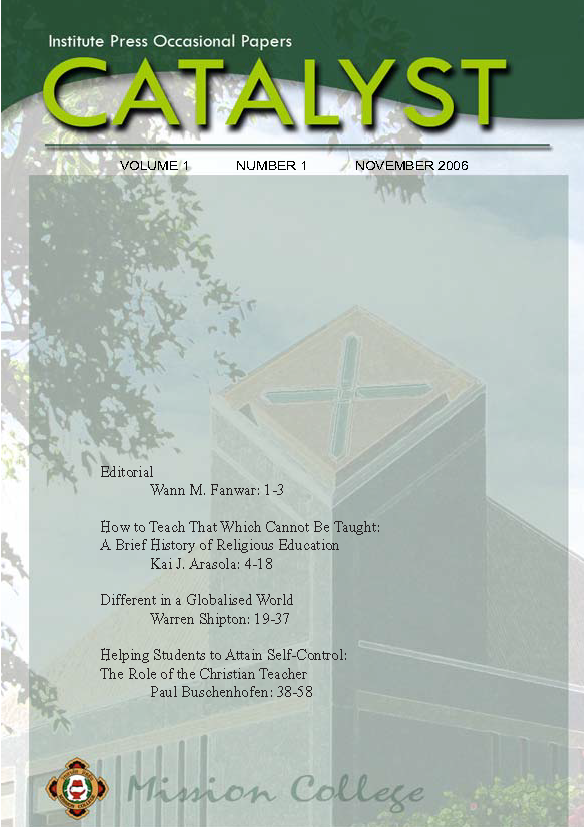Helping Students to Attain Self-control: The Role of the Christian Teacher
Main Article Content
Abstract
The Christian educator teaching in a Christian school has the goals of
reconciling fallen individuals to God and one another and restoring the image
of God in them (Knight, 1998:229). These goals have profound implications
for how these educators view their students, their own roles and the curriculum
they teach. Furthermore, central to this issue is the need for their students to
attain the self-discipline and self-control they need to consciously choose the
path of uniting their will with the will of their Saviour. This self-control cannot
be obtained merely in response to the word or will of their teacher. It is only
by teachers modelling, selecting and emphasising Bible-based techniques and
Christian values within the totality of their relationship with their students,
that they can best help them in developing the Christ-like character traits of
responsibility and self-discipline.
An important contribution to our understanding of the relationship between
teachers discipline techniques and student responsibility and self-discipline,
is the research of Ramon Lewis. Lewis found that more responsible classes
are associated with teachers who are less abusive and punishment oriented,
while teachers who use more punishment, more aggressive techniques such as
yelling in anger and class detentions, promote more misbehaviour and less
responsibility in their students. The findings of related research studies are
compatible with those of Ramon Lewis.
…These research outcomes find their ultimate meaning in the example of
Jesus, the Master Teacher, who, by building caring relationships with His
students , helped them discover both their personal needs and that better
way which can only be gained through self-discipline and responsibility based
on an internalisation of the principles, relationships and values of a God of
love.
The Christian teacher is in the fortunate position of being able to draw on
the resources of current research as well as the exemplary teaching style of
Jesus, in developing his / her own techniques to assist students in the vital
goal of attaining a lifestyle (both inside and outside the classroom) of
responsible action and self-control.
Article Details

This work is licensed under a Creative Commons Attribution-NonCommercial-NoDerivatives 4.0 International License.
Copyright: Asia-Pacific International University reserve exclusive rights to publish, reproduce and distribute the manuscript and all contents therein.
References
1998 Beginning Teaching and Beyond (Katoomba, NSW:
Social Science Press, 3rd ed).
Bennett, W.
1998 The Place to Harvest Patriots , School Administrator
55 (5): 38-40.
Brandt, R.
1995 Punished by Rewards? , A Conversation with Alfie
Kohn, Educational Leadership 53: 13-16.
Brown, H.D.
2001 Teaching by Principles: An Interactive Approach to
Language Pedagogy (New Jersey: Prentice-Hall, 2nd
edn).
Canter, L., and M. Canter
1992 Assertive Discipline: Positive Behaviour Management
for Today s Classroom (Santa Monica, CA: Lee Canter
& Associates).
Fenstermacher, G.D.
2001 On the Concept of Manner and its Visibility in
Teaching Practice , Journal of Curriculum Studies
33(6): 639-53.
Glasser, W.
1997 A New Look at School Failure and School Success ,
Phi Delta Kappan 78 (8): 597-602.
Holmes, A.F.
1987 The Idea of a Christian College (Grand Rapids:
William B.Eerdmans, rev. edn).
Houston, P.D.
1998 The Centrality of Character Education , School
Administrator 55(5): 6-8.
Hunt, J.McV.
1971 Toward a History of Intrinsic Motivation , in H.I.
Day, D.E. Berlyne, and D.E. Hunt (eds.), Intrinsic
Motivation: A New Direction in Education (Canada:
Holt, Rinehart & Winston).
Knight, G.R.
1998 Philosophy and Education: An Introduction in
Christian Perspective (Berrien Springs, MI: Andrews
University Press, 3rd edn).
Kohn, A.
1993 Rewards Versus Learning: A Response to Paul
Chance , Phi Delta Kappan 74: 783-787.
Lepper, M., and D. Greene
1978 The Hidden Costs of Rewards (Hillsdale, N.J.:
Erlbaum).
Lewis, R.
2004 Helping Teachers Help Students Act
Responsibility , Retrieved 11 May 2006, [http://
www.acer.edu.au/workshops/documents/]
Lickona, T.
1996 Teaching Respect and Responsibility: Reclaiming
Children and Youth , Journal of Emotional and
Behavioural Problems 5(3): 143-51.
Matthews, D.
1991 The Effects of School Environment on Intrinsic
Motivation of Middle-school Children , Journal of
Humanistic Education and Development 30: 30-36.
Metzger, M.
2002 Learning to Discipline , Phi Delta Kappan 84(1):
77-84.
Middleton, J.
1995 A Study of Intrinsic Motivation in the Mathematics
Classroom: A Personal Constructs Approach , Journal
for Research in Mathematics Education 26: 254-279.
Peterson, R.
1992 Life in a Crowded Place (Portsmouth, NH:
Heinemann).
Roeser, R.W., T.S. Eccles, and A.J. Sameroff
2000 School as a Context of Early Adolescents Academic
and Social-emotional Development: a Summary of
the Research Findings , The Elementary School
Teacher 11(5): 443-71.
Rothstein, T.
2000 Teaching Respect and Responsibility: Reclaiming
Children and Youth Journal of Educational and
Behavioural Problems 5(3): 143-51.
Ryan, K., and H. Patrick
2001 The Classroom Social Environment and Changes in
Adolescents Motivation and Engagement in the
Middle School , American Educational Research
Journal 38(2): 437-60.
Skinner, B.
1960 The Technology of Teaching (New York: Appleton-
Century Crofts, Division of Meredith Corporation).
Strong, R., H. Silver, and A. Robinson
1995 What do Students Want (and What Really Motivates
Them)? Educational Leadership 53: 8-12.
Valas, S., and N. Sovik
1993 Variables Affecting Students Intrinsic Motivation for
School Mathematics; Two Empirical Studies Based
on Deci and Ryan s Theory on Motivation , Learning
and Instruction 3: 281-298.
http://seamonkey.ed.asu.edu/-jimbo/RIBARY_Folder.htm


